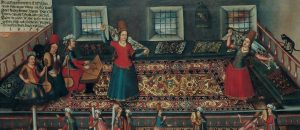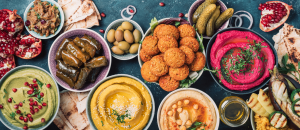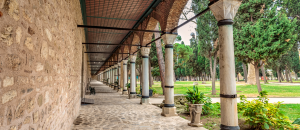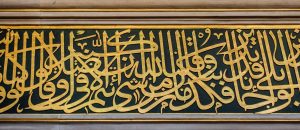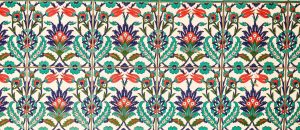In the heart of the Ottoman Empire, Topkapı Palace, the birth of a prince or a sultan was not just a family event but a matter of state, guaranteeing the future of the dynasty and the survival of the empire. For this reason, the health of the sultan who had given birth and her swift recovery were the utmost priorities of the chief palace physicians and midwives. During this delicate period, the postpartum stage, the care given to the mother was based on a comprehensive and holistic approach that could even make modern medicine envious. At the center of this approach was postpartum sherbet and its benefits, a magical elixir with its color, aroma, and healing ingredients. This traditional drink was not merely an offering but an ancient recipe that increased the mother’s milk, helped her body recover, and calmed her spirit. In this article, we will uncover the secrets of the palace’s postpartum tradition, discovering the ingredients of this crimson elixir and other special nutritional cures that strengthened the new mother.
The Continuation of the Dynasty: The Sacredness of Birth and Postpartum in the Ottoman Palace
In the Ottoman palace, birth, especially the birth of a prince, was called “veladet-i hümayun” (imperial birth) and celebrated with festivities lasting for days. These celebrations were seen as a guarantee for the continuation of the dynasty and were announced with joyful news throughout the empire. However, behind these magnificent celebrations lay an extremely meticulous care process aimed at protecting the health of the new mother and her baby. The postpartum tradition in the palace consisted of a series of rituals and rules intended to protect the mother from all dangers during the “forty days,” when she was most vulnerable both physically and mentally.
During this period, the mother’s room was specially heated, and experienced kalfa (senior female attendants) and midwives never left her side. The health of the Valide Sultans was of great importance, as they were the mothers of future sultans, so their nutrition was given special attention. The purpose of this special care was for the mother to regain the energy lost during childbirth, for her uterus to recover quickly, to eliminate the risk of infection, and most importantly, to produce abundant and nutritious milk for her baby. It was at this point that postpartum sherbet, one of the most delicious examples of Ottoman medical wisdom, came into play.
The Crimson Elixir: What is the Secret of Traditional Postpartum Sherbet?
Traditional postpartum sherbet is a healing drink known for its distinct bright crimson color, spicy and sweet aroma, served either hot or cold. It was customary to offer it to those who heard the news of a birth in the palace and to visitors coming to see the new mother. However, the primary purpose of this offering was to provide the support the new mother needed. The secret of the sherbet lay in each ingredient being carefully selected and composed of postpartum medicinal herbs and spices, each serving a specific purpose. This was not just a delicious drink, but also a medicine prepared with the wisdom of the chief physicians.
Healing Spices and Herbs in the Sherbet
The basis of postpartum sherbet, giving it its famous color, is a special spice and root dye mixture known as “lohusa şekeri” (postpartum sugar) or “kızamık şekeri” (measles sugar – a type of colored sugar). However, the true healing power of the sherbet comes from the potent spices added to this sugar. Each of these spices was known for specific benefits in traditional Ottoman medicine:
- Cinnamon (Stick): Known for its ability to balance blood sugar, cinnamon is also a powerful antiseptic. It warms the body, speeds up blood circulation, and prevents the mother from feeling cold.
- Clove: A natural painkiller and germicide, clove helps alleviate postpartum pain and prevents possible infections. Its pleasant aroma brings freshness to the mother.
- Ginger (Root): Known for its anti-nausea and digestion-aiding effects, ginger is also a powerful anti-inflammatory. It soothes the postpartum mother’s digestive system and increases the body’s resistance.
- Galangal: Coming from the same family as ginger, galangal has stomach-strengthening and gas-relieving properties. It helps prevent gas pains for both the mother and, through breastfeeding, the baby.
- Nutmeg (Small Coconut): When used in small amounts, it has a calming and relaxing effect. It helps the mother reduce postpartum stress and sleep more comfortably.
In addition to these main ingredients, other warming spices like black peppercorns or allspice were sometimes added. This mixture was boiled with water, brewed, and made ready for consumption.
Miraculous Effects on Mother and Baby’s Health
This powerful mixture of ingredients in postpartum sherbet provided numerous benefits to the new mother. These benefits included effects that can be explained scientifically as well as those based on traditional wisdom.
- Increases Breast Milk (Galactagogue Effect): Postpartum sherbet is one of the most well-known drinks that increase breast milk. The warm spices in its content increase blood circulation and support the body’s fluid intake, triggering milk production (lactation). This is the sherbet’s most recognized and important benefit.
- Helps the Uterus Recover: The process of the uterus returning to its original state (involution) after childbirth is important. Warming spices like cinnamon and ginger help accelerate this process by increasing blood flow and aid in the more regular expulsion of postpartum bleeding (lochia).
- Provides Energy and Improves Blood: Postpartum sugar is a natural source of sugar that helps the mother quickly regain the energy lost during childbirth. It also contains spices traditionally known as “blood-building”.
- Strengthens Immunity: The antiseptic properties of spices like clove and cinnamon protect the mother, who is more vulnerable to infections during the postpartum period.
- Improves Mood: The warmth, sweet taste, and pleasant aroma of the sherbet make the mother feel good. This provides important emotional support in overcoming postpartum emotional fluctuations and the condition known as “postpartum blues”.
Not Just Sherbet: The Nutritional Program That Strengthened Valide Sultans
Postpartum care in the Ottoman Empire was not limited to postpartum sherbet. This was just one part of a comprehensive nutritional cure designed to meet all the mother’s needs. These traditional postpartum cures consisted of foods that were easily digestible, highly nutritious, and had milk-increasing properties.
Special Soups and Compotes That Increase Milk
The basis of the postpartum mother’s diet consisted of plenty of fluid-rich and nutritious foods. Especially soups prepared with bone broth, rice, mint, or dill were ideal options that were both easy to digest and met the mother’s fluid and mineral needs. Dill and spices like cumin were also believed to have milk-increasing properties.
In addition to sherbet, unsweetened or low-sugar compotes (hoşaf) made from dried or fresh fruits were also frequently consumed. Especially hoşafs made from apricots, figs, and grapes, provided plenty of fiber to aid digestion and gave the mother energy with their natural sugars.
Energy-Giving Pastes and Desserts
Special pastes and desserts were also prepared to replenish the energy lost after childbirth. However, these desserts were not sources of empty calories. Halvas, usually prepared with high-nutritional-value ingredients like tahini, molasses, walnuts, and almonds, or starchy desserts called “peltize” made with “postpartum sugar,” were preferred. These foods provided the mother with healthy fats, protein, and important nutrients like iron, helping her recover quickly.
Forty Days Ceremony and Other Traditions: Rituals of the Postpartum Period
In addition to nutrition, the postpartum period was also supported by spiritual and cultural rituals. The first 40 days, known as “kırkı çıkmak” (completing the forty days), were believed to be the time when the mother and baby were most susceptible to negative spiritual influences like “al basması” (a mythical affliction). At the end of this period, a ceremony called “kırk uçurma” (forty-day flight) was held. The mother and baby were washed in the “kırk hamamı” (forty-day bath) with special prayers, and then they visited elder family members and neighbors, going out of the house for an extended period for the first time. These visits were a ritual to reintroduce the mother and baby into social life and to welcome them.
Healing from History: The Place of Ottoman Traditions in Today’s Maternal and Child Health
Postpartum sherbet and its benefits remain a living tradition in Turkey and many Balkan countries today. Modern medicine confirms the wisdom behind this ancient recipe. The anti-inflammatory and antioxidant properties of spices, the positive effect of hydration on milk production, and the importance of nutritious foods in postpartum recovery are facts that are scientifically accepted today.
Ottoman palace postpartum care reminds us of an important lesson that modern people have forgotten: the postpartum period is a sacred time when the mother needs the most support, both physically and mentally, and must be carefully protected. These healing recipes and compassionate rituals, filtered through history, are the most delicious proof that the wisdom of the past can still shed light on today’s maternal and child health.





